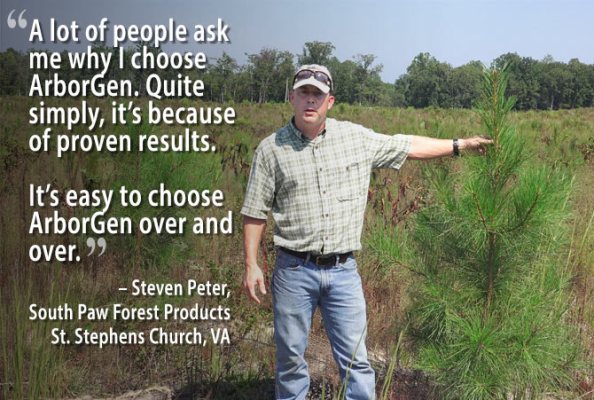TreeLines
May 2020 – 2nd Edition
Are You Overpaying For Your Seedlings?
How to Make Sure You’re Really Getting What You Want.
 Customers shopping for seedlings will come across the term ‘Elite’ from multiple providers. But not all seedlings named ‘Elite” are the same. This naming scheme can cause confusion and makes it hard to know if you are truly getting the level of seedling you purchased. In 2012, ArborGen’s geneticists devised a clear and meaningful system of naming seedling products by categories that assure customers they are buying the levels of performance they want.
Customers shopping for seedlings will come across the term ‘Elite’ from multiple providers. But not all seedlings named ‘Elite” are the same. This naming scheme can cause confusion and makes it hard to know if you are truly getting the level of seedling you purchased. In 2012, ArborGen’s geneticists devised a clear and meaningful system of naming seedling products by categories that assure customers they are buying the levels of performance they want.
When ArborGen attaches the term ‘Elite’ to either Open Pollinated (OP) or Mass Control Pollinated (MCP®) seedlings, it has a specific, data-driven meaning. We use a scientifically rigorous methodology to classify all of our seedlings with field performance data to back it up.
What Does ‘Elite’ OP Mean When ArborGen Says It?
We use a clear and meaningful system of naming seedling products by categories to assure customers are buying the levels of performance they want. Coupled with the use of the North Carolina State University Tree Improvement Cooperative PRS scores, you will see our categories track very well with the PRS system.
We have three levels of OP seedling families:
- Advanced = the top 25% to 11%
- Select = the top 10%-4%
- Elite = the top 3%
These categories simplify your purchase decision by combining the four most important value traits into a final score:
- Growth
- Rust Resistance
- Straightness
- Forking
When ArborGen says Elite, You Can Bank on It.
Most seedling providers do not follow this rigorous approach when classifying their seedlings. They may use this term strictly for marketing purposes, confusing customers. This confusion means that customers who buy ‘Elite’ seedlings from other providers may be overpaying for the seedlings they are getting.
Recently some customers discovered seedling families being presented to them as ‘Elite’ would only be graded as Select in our classification system, a step down in performance from an ArborGen Elite. In this case, the customers would have over-paid had they purchased those seedlings. Elite is just a name unless you can prove it – and we can!

ArborGen MCP families are hybrids among the best seedling parents in each region of the US South. Mass control pollination or controlled mass pollination is a fertilization technique used to produce large quantities of a single cross between parents. Just because two parents are crossed doesn’t mean they meet the demanding performance standards ArborGen uses.
ArborGen MCP is set apart from other providers’ seedlings because our MCP families are well-tested with data from hundreds of field trials, documenting each one’s performance and value. With more than 60 hybrid crosses, we also rank their performance with clearly defined levels of growth and quality traits to arrive at ArborGen’s Advanced, Select or Elite MCP classification system.
Some seedling providers only sell ‘elite’ CMP seedlings. However, when comparing other providers ‘elite’ performance scores, many of the crosses do not pass ArborGen’s strict scientific standards to be one of our OP Elite and certainly not good enough to match up to our MCP Advanced level.
Make Sure You Compare “Apples to Apples”.
When shopping for seedlings, if you rely on seedling names or categories, you are setting yourself up to overpay. Instead, ask for detailed performance information, including not only the PRS but also field trial.
We believe you should only pay for what you get – and you deserve to feel confident about that. Because of this, ArborGen is committed to total transparency in providing meaningful classifications and giving you the performance data that backs it up.
Call the ArborGen Reforestation Advisor for your area who will provide all the information you need to help you perform a true comparison.

Customer Success Story
“The height gain from these genetically improved seedlings is impressive. What’s even more impressive, however, is the straightness and uniformity of the trees and the low or nearly no incidence of disease as compared to open pollinated trees.”
Perry Clements,
Consulting Forester,
Rozier and Associates

What’s Happening
Need a trusted partner to guide the way?
Get in touch with a Reforestation Advisor to explore your options!

Paul Jeffreys, Ph.D.
Alabama & Northern Mississippi
Manager Special Projects & Sustainability
205-712-9582

Austin Heine
North Carolina & Virginia
910-660-3209

Blake Sherry
Florida, Southern Georgia, & Southern Alabama
912-433-5407

Drew Fasano
South Carolina & Northern Georgia
843-520-6865

Jeff Slaga
Arkansas, Louisiana, Oklahoma & Texas
936-212-1029

Kylie Burdette
U.S. Sales Manager
864-650-4454

Jason Watson
Director, U.S. Sales
404-840-7489
FIND AN ADVISOR OR NURSERY

